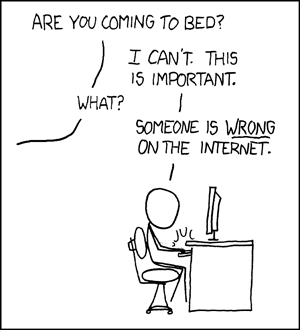Humans feel the need to correct each other. If you make a speling mistake in a blog post, someone will let you know. If you make an inaccurate movie reference at a dinner party, a friend will chime in with a correction. Sometimes, people will correct you even when you’re right.
Why do they do it? It’s not like you get some monetary benefit or prize. At best you gain some fleeting satisfaction. How much is the person you’re correcting even benefiting from the exchange? Maybe you’ve provided important knowledge that will help them, but that’s rarely the case.
Moreover, it’s likely that when you correct others, they like you less. You burn goodwill with them. Just as you like to be right, so too does your counterparts. So, when you correct someone, even if you’re right, you could lose because now this other person is less disposed to help you in the future. Psychologist Suzanne Phillips writes:
Public correction of reality does little to effect change or elicit support. The exposure generally fuels shame and defensiveness. While your friends may like reality shows – rarely do they like seeing their friends embarrass each other or feeling the pressure of taking sides.
What is it about seeing an error that makes people want to correct it? One explanation from Psychology Today is that we have a Pavlovian response to being correct. As we go through school, we’re conditioned by being rewarded with good grades and praise for being right and scolded for being wrong:
Our educational system is rooted in the construct of right and wrong. We are rewarded for what are deemed to be correct answers and the ensuing higher grades, which generally lead to more successful lives. Being right affirms and inflates our sense of self-worth. As students we learn to avoid as best we can the embarrassment of being wrong.
Or maybe the impulse to correct goes to our primordial roots. Are we evolutionarily tuned to want to be correct (people who are wrong a lot end up dead more often), or do our egos and sense of self only thrive if we constantly prove that we are right? Are we just born this way?
Nowhere is this human tendency to correct each other more on display than the internet. Since so much is published online, people have ample opportunity to respond through comments, tweets, reblogs and Facebook posts. But what do the commenters gain from providing corrections or a different opinion? They expend their time, which is a very real cost, but what do they get back? If anything, ranting on websites makes you feel worse.
Much is written about the psychology of internet trolling (mean spirited commenting). But why are people commenting online in the first place and correcting each other in the real world?
What is it about pointing out that someone else is wrong that is so appealing?
This post was written by Rohin Dhar. His self-esteem will take a hit, but you should still prove him wrong in the comments. Follow him on Twitter here or Google.




